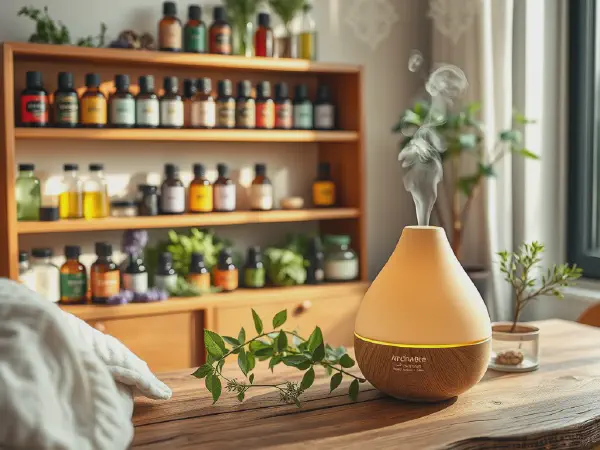Incorporate Aromatherapy: Essential Oils in Daily Routine

The Healing Power of Aromatherapy
Aromatherapy is a holistic healing practice that utilizes the natural fragrance of essential oils extracted from plants to enhance physical and emotional well-being. This ancient method dates back thousands of years and has gained immense popularity in today's wellness community. The potent scents of various essential oils can influence mood, promote relaxation, and provide therapeutic benefits beyond their delightful aromas. With a growing interest in holistic health, aromatherapy has become a prominent tool in self-care routines.
The essence of aromatherapy lies in its ability to engage the senses, primarily the sense of smell. When inhaled, essential oils can stimulate the olfactory system, which is closely linked to the limbic system in the brain—the area responsible for emotions, memories, and behaviors. This connection helps explain why certain smells can evoke specific feelings or memories, allowing aromatherapy to play a vital role in emotional healing and stress reduction. Furthermore, aromatherapy can be integrated into daily routines to create a calming environment, making it an essential practice for those seeking balance and tranquility.
Many people find that incorporating Aromatherapy into their daily routine enhances their overall well-being and relaxation.
Aside from emotional benefits, aromatherapy also offers numerous physical health advantages. Essential oils possess various properties, including anti-inflammatory, antimicrobial, and analgesic effects, which can assist in alleviating common ailments. For instance, lavender oil is renowned for its calming properties, often helping to improve sleep quality, while peppermint oil can provide relief from headaches and digestive issues. By incorporating essential oils into a wellness regimen, individuals can support their overall health and complement other treatments effectively.
Understanding the different essential oils and their uses is crucial in practicing aromatherapy. Some oils are known for their uplifting capacities, such as citrus oils like lemon and orange. Others, like eucalyptus and tea tree oil, have decongestant properties that can alleviate respiratory conditions. It is essential to research and experiment with various oils to discover the most beneficial combinations tailored to individual needs. As one learns about aromatherapy, the journey becomes not only restorative but also a delightful exploration of scents and their therapeutic potentials.
Incorporating aromatherapy into everyday life is easier than many might think. Whether through essential oil diffusers, topical applications, or scented candles, the fragrance of essential oils can enhance one’s living space, promote relaxation, and elevate mood. By understanding the basics of aromatherapy and essential oils, individuals can effectively harness this natural wellness tool to foster a healthier lifestyle.
Benefits of Aromatherapy
Aromatherapy provides profound physical health benefits through the use of essential oils. Many essential oils contain anti-inflammatory and antibacterial properties, making them useful in supporting the immune system. For instance, eucalyptus oil can help clear nasal passages and ease respiratory discomfort, while tea tree oil is known for its antiseptic qualities. Additionally, essential oils like ginger and chamomile can aid in digestion and reduce nausea, offering a natural remedy for everyday ailments.
Beyond physical health, aromatherapy significantly impacts emotional well-being. Certain essential oils, such as lavender and ylang-ylang, are proven to reduce anxiety and promote a sense of calm. The aromatic compounds from these oils can trigger positive emotional responses, helping individuals manage stress and improve overall mood. By incorporating such oils into daily practices, individuals can proactively support their mental health and foster a more balanced emotional state.
Aromatherapy is also known for promoting relaxation and reducing stress. The calming effects of essential oils engage the senses and create a soothing atmosphere, ideal for unwinding after a long day. Diffusing oils like chamomile or bergamot can help create a peaceful environment, making it easier to relax, meditate, or fall asleep. By setting aside time for aromatherapy, individuals can create a dedicated space for relaxation and rejuvenation in their lives.
Essential Oils for Beginners
For those new to aromatherapy, it’s essential to start with beginner-friendly essential oils that are versatile and easy to use. Some popular options include lavender, tea tree, peppermint, lemon, and eucalyptus oils. These oils not only have a wide range of benefits but are also commonly found and affordable, making them accessible for aromatherapy newbies.
When choosing essential oils, it’s important to consider personal preferences and the desired effects. Each essential oil has its own unique properties; for example, lavender is great for relaxation, while citrus oils can uplift the mood. Beginners should experiment with different oils to find those that resonate with them and address their specific needs, whether for relaxation, energy, or stress relief.
Safety is crucial when using essential oils, especially for beginners. Essential oils are highly concentrated and should never be applied directly to the skin without dilution in a carrier oil, such as coconut or jojoba oil. Additionally, some essential oils may not be suitable for pregnant women, children, or individuals with specific health concerns, so it’s essential to conduct thorough research and consult with a healthcare professional when starting an aromatherapy routine.
Incorporating Essential Oils in Daily Life
One effective way to incorporate essential oils into daily life is by diffusing them in your home. Essential oil diffusers disperse the oils into the air, creating a delightful aroma that can promote relaxation and improve mood. Different blends can be used at various times of the day, such as energizing citrus oils in the morning or calming lavender oil in the evening to signal bedtime.
Another way to enjoy the benefits of essential oils is by using them in skincare. Many essential oils can enhance skincare routines, offering benefits such as hydration and acne treatment. For instance, tea tree oil is known for its antimicrobial properties, making it effective in treating blemishes. However, remember to dilute essential oils in a carrier oil before applying them to the skin to avoid irritation.
Incorporating essential oils into yoga practices can further enhance relaxation and mindfulness. Adding a few drops of calming essential oils like lavender or sandalwood to a diffuser while practicing yoga sets a tranquil atmosphere, allowing for deeper relaxation and focus during each session. These aromatic influences may intensify meditation, enhancing the overall experience.
Aromatherapy Techniques
There are various methods of applying essential oils, which can be highly adaptable to personal preferences. Common techniques include topical application, inhalation, and diffusion. Topical application involves mixing essential oils with a carrier oil and applying them to the skin, such as on pulse points or areas of tension. Inhalation can be as simple as placing a few drops on a tissue or using a diffuser to disperse scents in a room.
Creating custom aromatherapy blends allows individuals to tailor their experiences further. By mixing different essential oils, one can achieve a unique scent tailored to specific emotional or physical needs. A combination of calming oils like lavender and uplifting oils like lemon can create a beautiful balance that promotes relaxation and revitalization simultaneously. Individuals are encouraged to experiment with ratios and combinations to find the most pleasing and beneficial blends.
Aromatherapy can also be particularly effective for stress relief. Utilizing calming essential oils like chamomile and frankincense can help ground the mind during stressful situations. Engaging in deep breathing while inhaling these scents can significantly reduce anxiety and foster a sense of peace, making it a powerful tool in stress management practices.
Home Aromatherapy Practices
Creating DIY aromatherapy candles is a wonderful way to enjoy the benefits of essential oils in a cozy setting. By melting natural wax and adding essential oils, individuals can make custom-scented candles that not only smell pleasant but also promote wellness. For example, a blend of vanilla and sandalwood can create a warm atmosphere conducive to relaxation.
Essential oils can also enhance cleaning products, providing a natural and fragrant alternative to chemical-laden options. Oils such as lemon and tea tree oil possess antibacterial properties, making them ideal for use in homemade all-purpose cleaners. Adding essential oils to cleaning solutions can refresh your space and support a healthier home environment.
Incorporating aromatherapy into home decor can elevate the ambiance of any room. Using diffusers, essential oil sprays, or even decorative potpourri can inspire a positive atmosphere. Fragrant plants like rosemary or lavender can also add visual and aromatic appeal while contributing to the health of the indoor environment.
Essential Oils for Specific Conditions
Essential oils can be particularly effective for addressing specific conditions, such as anxiety relief. Oils like bergamot and clary sage are well-known for their anxiety-reducing effects. Inhaling the aroma of these oils can help calm the mind and promote relaxation during stressful times, making them ideal for use in diffusers or during meditation.
Using essential oils can also enhance sleep quality. Lavender oil, renowned for its soothing properties, is often employed in nighttime routines to support relaxation and facilitate a peaceful sleep environment. Diffusing lavender oil before bedtime or applying diluted oil to pulse points can make a significant difference in the quality of sleep.
Managing headaches with essential oils is another effective technique. Peppermint and eucalyptus oils are commonly used to relieve headache symptoms due to their cooling and analgesic properties. Applying diluted oils to the temples or inhaling their fragrance can provide immediate relief from tension headaches and migraines.
